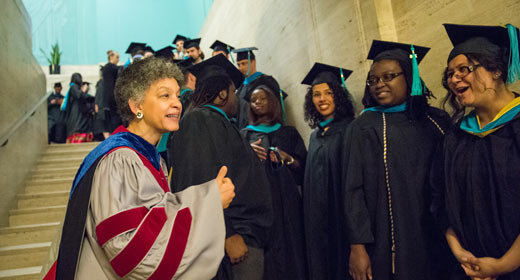
"I'm Susan Collins, the Joan and Sanford Weill Dean of Public Policy."
It's been ten years since Susan M. Collins joined the Ford School as "the Joan and Sanford Weill Dean of Public Policy," a phrase she has repeated, with no small amount of pride, thousands of times over the past decade. She will step down from the role at the end of her second and final term this June, and looks forward to a long overdue sabbatical, and throwing her energies into research, teaching, and public engagement.
Collins sees transitions as healthy—opportunities to make new connections and to innovate—but the end of her tenure is also bittersweet.
"Once the Ford School gets into your blood, it kind of stays there," she says.
Collins has forged strong relationships during her deanship—across the university and around the world, as well as within the Ford School family. Those are connections she has come to treasure.
"Small but mighty."
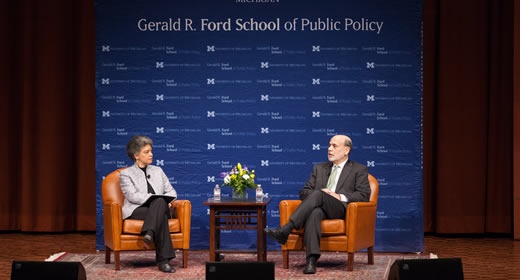
"I always get a laugh when I say the Ford School is small but mighty, because of course, I'm kind of small," says Collins.
The Ford School is still the smallest of U-M's schools and colleges in lots of dimensions, she says, but it's bigger than it was when she arrived. And if you count faculty impact, talented and driven students, and fascinating, highly engaged alumni, she says, the school is among the best.
One of the priorities that Collins is known for championing during her tenure is spreading the word about the community's accomplishments—raising the school's visibility at U-M, and in policy circles more broadly.
"Susan pushed hard, and really had to drag the faculty behind her," says John Chamberlin, who served as interim dean in the late '90s. "I think she exercised real leadership there."
"Having done the analysis."
Collins wants to be clear—she's not a self-promoter, and she wasn't interested in visibility for visibility's sake.
"I was a really staunch supporter that you don't talk until you have something to say—you don't want to be known as the wind bag; you want to be known for having done the analysis, for having depth of understanding of what the challenges are," she says. "It's one of the reasons I've always cared about having a foot in academia, because that's one of the things academics stand for."
Collins had spent most of her life on the East Coast. She earned a bachelor's in economics at Harvard and a PhD in economics at MIT. She taught at Harvard, then at Georgetown, where she worked simultaneously as a senior fellow at the Brookings Institution.
On the East Coast, she says, visibility was always a priority.
But when Collins came to the Ford School, and saw the caliber of the work being done by faculty and alumni, she felt the school didn't get the attention it deserved.
"Not the goal, just the means."
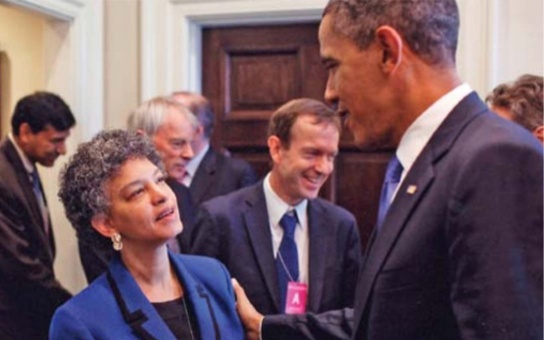
Collins made an early commitment to faculty recognition, and invested a considerable amount of time in nominating faculty for prestigious awards both within the U-M community, and beyond. As a result of her efforts, 10 Ford School faculty members were recognized with a range of awards, including a National Medal of Science, a Thurnau Professorship, a Distinguished University Professorship, and more.
Collins set out to publicize faculty work, and the work of the school and its alumni, through communications, as well.
At the start of her deanship, the Ford School had a web site and a newsletter.
LinkedIn had launched in 2003; Facebook and Flickr had launched in 2004; YouTube had launched in 2005; Twitter had launched in 2006; but the school didn't have a single social media account. The school's communications suite now includes all of these, plus a biannual magazine, a sophisticated website, and a well-known lecture series—all of which allow the school to reach new audiences.
Collins also promoted Ford School accomplishments, and the legacy of President Ford, during back-to-back centennials that attracted hundreds of visitors, and national attention, in 2013 and 2014.
"Under Susan's leadership, the visibility of the Ford School—both internal to U-M and more broadly—has been transformed," says Paul Courant, who served as director of the school for four years in the '80s and two years in the '90s, and who is now serving (for the second time) as acting provost at U-M.
But visibility and engagement—ideals Collins has pushed for—weren't the goal, she clarifies. "They're just ways to accomplish the things that further our mission and the things that our students, and alumni, and staff, and faculty all care about."
"The real goal, and the underlying work"
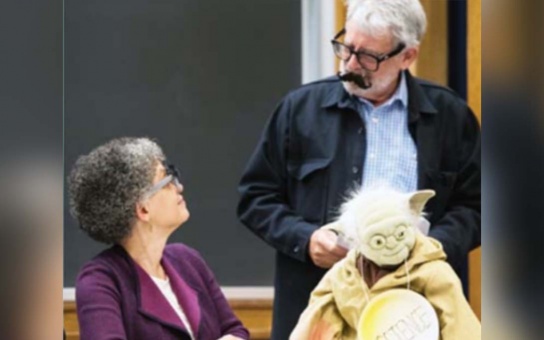
The real goal, and the underlying work, was educating students for careers of influence, conducting top-notch research, and tackling real-world challenges through service and engagement on policy issues that matter.
Increasing access to higher education, improving public health, fostering international development, advancing sustainability, eliminating discrimination—this was the mission, along with preparing students for careers of influence in these and other policy areas.
For students, it's been possible to make a difference in many of these fields while pursuing their degrees.
Over the past decade, students have assisted dozens of public sector organizations through the Applied Policy Seminar, now called Strategic Public Policy Consulting or SPPC. They've organized International Economic Development Program courses and trips to 10 nations. They've interned with more than a thousand organizations doing meaningful work all around the world. They've raised more than $100,000 for worthwhile causes through the student-led charity auction. They've led student organizations; they've volunteered extensively; they've founded nonprofits. Collins, who believes deeply in engaged learning, "has lauded and supported all of that work," says Susan Guindi, director of student and academic services.
"An outsized impact"
For Collins herself, the focus was on improving economic policy, and improving policy education more broadly. She's done that as a member of the board of directors of the Federal Reserve Bank of Chicago and the bank's Detroit branch, as an active participant in the annual Jackson Hole economic summit, as a contributor to White House conversations on jobs and economic growth, and as president of the Association of Professional Schools of International Affairs (APSIA).
Collins looks across the school today and sees a similar dedication to impact everywhere she turns.
She sees it in the explosion of engagement, among students and faculty, in the City of Detroit. She sees it in the Ford School's accomplished alumni, who are doing phenomenal work in the world, and going the extra mile to support students who share an interest in their fields. She sees it in the academic offerings for undergraduate and master's students—both programs that underwent extensive curricular reviews during her tenure, and that emerged from the process with important strengths. She sees it in expanding international engagement—with new courses, and multiple research initiatives, around the world. She sees it in the research and service portfolios of faculty members. She sees it in thriving Ford School programs like the Education Policy Initiative, Michigan Public Policy Survey (p. 10), Energy and Environmental Policy Initiative, Policies for Action Research Hub, and Youth Policy Lab. She sees it in Poverty Solutions at the University of Michigan—a university-wide initiative to address poverty, but one that's led by Luke Shaefer, a professor of public policy and social work.
"The Ford School has an outsized impact in education, health policy, social policy, environmental policy, human rights policy—a wide range of things," says Collins. "Given our size, to have an impact in so many areas is impressive."
"We're very proud of things like that."
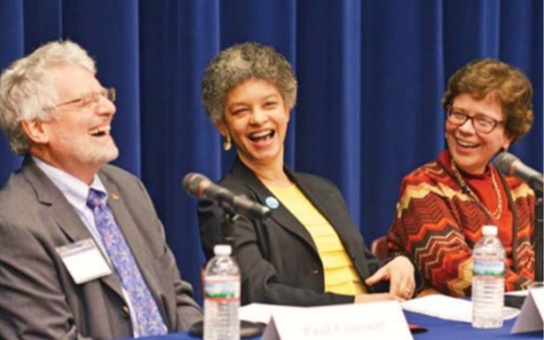
Beyond policy engagement, Ford School faculty members are also sought-out sources for the media, providing data, context, and clarity as news stories emerge and unfold (p. 30).
Since 2008, when the Ford School began tracking, media mentions have quadrupled. This year, Collins notes, the University of Michigan compiled a list of faculty media mentions in international papers, and two of the top five U-M faculty members on the list were right here, at the Ford School. "We're very proud of things like that," she says.
Of course, policy engagement and visibility help our students, too, she argues. "If they're talking to employers who've heard more about where they're coming from, it's going to help them in their job searches."
That visibility has also helped with Collins' fundraising efforts on behalf of the school.
The Ford School has twice as many endowed funds now as it did at the start of her tenure, and the market value of the school's endowment has increased from $28 million in 2006 to $39.5 million today. Those resources will help Ford School students far into the future.
"You have to keep doing it."
Collins, a Jamaican American, has done a great deal to champion the school's diversity, equity, and inclusion agenda, as well.
"We're very proud that our master's program is the most diverse graduate program at U-M," she says. "We're proud of faculty research and policy engagement in this area (p. 23), we're proud of our ongoing participation in the Public Policy and International Affairs program (p. 16), we're proud to have hired 20 impressive new faculty—more than half of them women—and to have expanded our faculty's intellectual diversity, as well."
More recently, and under Collins' leadership, the school has worked to strengthen the climate of inclusion. She has pushed to ensure that the school's public lecture series, Policy Talks @ the Ford School, invites a diverse slate of speakers each year. And she has encouraged faculty and staff to lead community conversations on timely topics, and to offer more support to students and student leaders.
"If you look back at our speakers, they've included high impact Latinos, African Americans, many impressive women, and policy leaders with a range of political perspectives," she says.
"And we've made sure that any time it was possible, those speakers met and spoke to students, and could talk about their experiences in a small group, so students could reach out and ask them the kinds of questions they've asked me, ‘What's it like to be a black woman, with kids, in a leadership role? How do you handle that?'"
Still, every two years, says Collins, there's a whole new group of students. "They don't remember. They don't know. They weren't here. So you have to keep doing it."
"If you want to go far, go together."
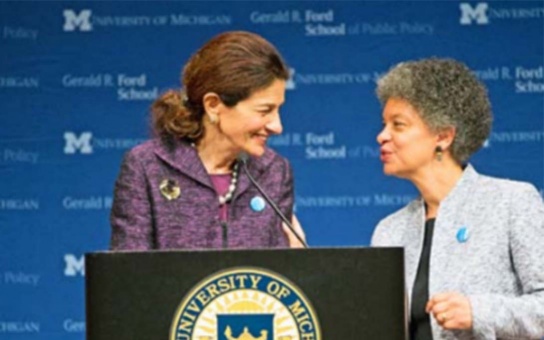
"If you want to go fast, go alone. If you want to go far, go together." It's an adage that Collins repeats often, and one that has informed her deeply collaborative approach to leadership and management."
Collaboration is hard—not just hard work, but also difficult to do," she says. "I think it's important, though, for everyone who works in an organization to feel like their ideas matter. It doesn't mean we can act on everything, or that everything moves forward, but it's an important value."
More than that, Collins believes that collaboration—both within and outside of the school—advances innovation and creativity. She points to collaborative ventures the school has launched with alumni as one example—Mock Interview March, Alumni Admissions Ambassadors, Worldwide Ford School Spirit Day, and more.
"When you bring people together, and encourage them to think about a problem together, each sees it in a different way," she says. "That's really about diversity—the diversity of ideas and perspectives and backgrounds."
That approach, she says, is integral to the Ford School culture.
"You can't get away."
Collins hasn't had a sabbatical in 17 years—something known as ‘a long dry spell' in academic circles—and will begin hers on July 1. After that? She'll return to the Ford School to serve as a collegiate professor, and has chosen to honor the Ford School's first dean, Ned Gramlich, with her named professorship.
"The Ford School has had a number of wonderful leaders," says Collins, who will soon be introducing herself everywhere as "the Edward M. Gramlich Collegiate Professor of Public Policy." She notes that many of the deans that preceded her have stayed engaged with the school—something she plans to do, as well—and that they laid a strong foundation that has benefitted the school's students, faculty, and alumni ever since.
"Becky [Blank] focused on this phenomenal building, getting the BA program started, and launching the joint-PhD program," says Collins. "Edie [Goldenberg], Paul, Ned, and John positioned the institute to become a standalone school…. There were big shoes to fill."
At the DC alumni reception this winter—Collins' last as dean—she sat down to converse with Keith Fudge (MPP ‘09), chair of the Ford School's Alumni Board, about the future of policy education, and her own plans for the future.
"You can't get away from us—we're all over the place," said Fudge.
"I won't be trying," she replied, with a smile.
Back at the Ford School, Collins talked more about her plans for the future.
"There are so many ways to make an impact—on policy issues that I really care about—through research, teaching, and engagement," she says. "The Ford School is a wonderful platform for that."
Below is a formatted version of this article from State & Hill, the magazine of the Ford School. View the entire Spring 2017 State & Hill here.
